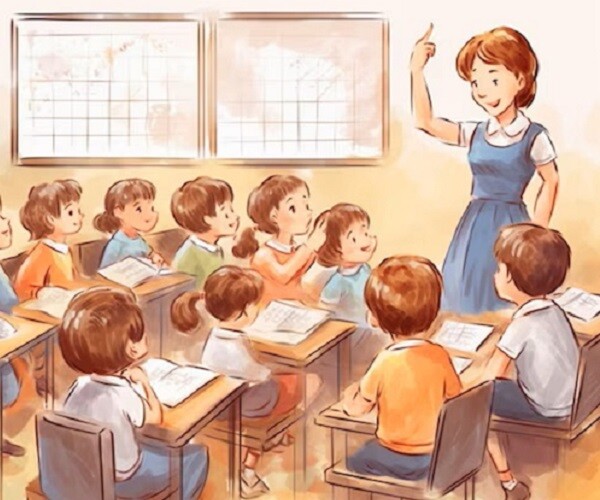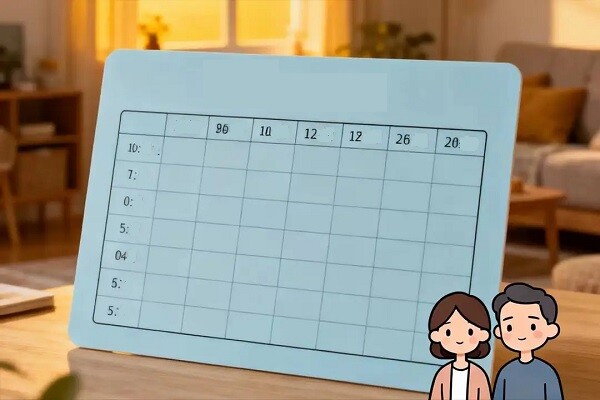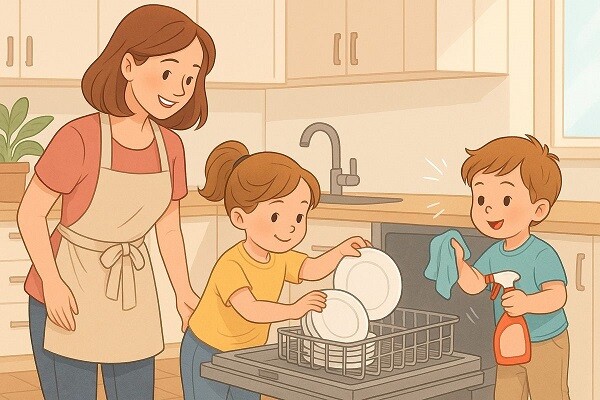In reality, the early years of elementary school are the golden period for building habits in children. If parents grasp the right principles, children can develop routines without the need for scolding or frustration.
There are 4 key points to remember, and understanding and applying them correctly will make parenting feel more effortless.


Time Management
In the morning, many children wake up like “little sloths,” taking as long as half an hour just to get dressed, wash their faces, and brush their teeth.
When doing homework, they fidget, look around, and turn a one-hour task into three.
Before going out to play, they ask for “just 5 more minutes,” which stretches into two or three rounds before they finally agree to come back.

This actually has a scientific basis. According to the theory of self-regulation in developmental psychology, children’s “slowness” isn’t intentional procrastination but stems from a vague concept of time and underdeveloped self-management skills. They simply don’t know what “fast” or “slow” means.
To help children master time, parents can use visual and fun methods:
Visualize a Schedule
Create a timetable with your child:
– 7:00 AM: Wake up.
– 7:30 AM: Breakfast.
– 8:00 AM: Go to school.
Use images, colors, or icons to make it easy for them to see, remember, and follow.

Use an Hourglass to “Feel” Time
When your child is getting dressed or doing homework, set a 10-15 minute hourglass and say, “If you finish before the sand runs out, you’ll get a small reward!” This helps children directly experience the passage of time.
Time-Based Games
Turn tasks into challenges:
– “Clean up your toys in 10 minutes!”
– “Get dressed in 5 minutes!”
Then praise them specifically: “You were 2 minutes faster today, great job!”
Through these small activities, children gradually learn to manage time, become self-reliant, and naturally develop punctual habits.

Organizing Belongings
After playtime, toys are scattered everywhere, turning the living room into a “battlefield.”
Schoolbooks are mixed up in the bag, making finding what’s needed feel like a “treasure hunt.”
Clothes are tossed everywhere, making the wardrobe resemble a “general store.”
According to the theory of the sensitive period for order in developmental psychology, young children strongly need to develop a sense of order. Organizing belongings helps them learn to categorize, fosters responsibility, and enhances self-management skills.

To support children, parents can make cleaning fun:
Play together: Sort toys into a blue box, books into a yellow box, and clothes into a red basket. Label the boxes to help children remember where things go and easily return them.
Organizing challenges: Choose one day a week for organizing, like a Sunday morning mini-game: “Let’s see who can tidy up fastest, neatest, and most correctly!” Then praise them specifically: “Today you lined up your toys neatly, making them easy to find!”
Self-responsibility: Let children organize their schoolbags, fold their clothes, and tidy their desks. Gently guide them: “How do you think you should arrange your books so they’re easiest to find tomorrow?”

Focusing Ability
When doing homework, many children twirl their erasers, get up for water, or “need to use the bathroom.”
In class, they’re easily distracted by everything around them and miss what the teacher says.
Reading a book, they flip through a few pages and then abandon it, moving on to another without focusing.
According to attention development theory in neuroscience, young children have a naturally short attention span, only about 15-20 minutes. Focus isn’t innate but needs purposeful training to gradually extend over time.
To help children build their “attention muscles,” parents can use these simple methods:
Focus-Building Games
Guide children to play games like:
– Schulte Grid (a 5×5 grid to find numbers in order).
– Puzzles.
– Building with Legos.
These games enhance their brain’s ability to maintain focus and filter information.

Segmented Learning
When doing homework, apply a 20-minute focus cycle followed by a 5-minute break: “Study seriously for 20 minutes, then take a 5-minute break.”
This method aligns with natural attention spans and helps children learn to manage their energy.
Minimize Distractions
Turn off the TV, keep phones out of sight, put away toys, and create a tidy, quiet study area.
The more minimalist the environment, the easier it is for children to focus.

Emotional Management
A lost toy triggers an immediate tantrum.
A disappointing test result leads to irritability.
Unmet demands result in crying and whining.
According to emotion regulation theory in developmental psychology, young children lack the skills to manage strong emotions. They need guidance to identify, express, and adjust their emotions. Emotion regulation isn’t about suppression but learning to express emotions appropriately.
To help children master their emotions, parents can try:
Emotion Cards
Create simple cards with your child: happy, angry, sad, scared. When they have an emotional outburst, gently ask: “Can you point to how you’re feeling right now?” This helps them name their emotions instead of lashing out.
Emotion Journal
Prepare a notebook for them to draw or write: “What happened today? How did you feel?” Then discuss: “Next time, what could you do differently?” This teaches them emotional problem-solving.

Deep Breathing for Calmness
When they’re very angry, teach the 4-4-4 breathing technique: Inhale for 4 seconds, hold for 4 seconds, exhale for 4 seconds.
Say: “Let’s breathe together to let the anger float away.” This habit helps them regain calmness quickly.
Good habits are a lifelong treasure for every child, and the early years are the golden period to build this foundation. By focusing on four core skills—time management, organization, focus, and emotional management—children can transform from being “procrastinators, messy, restless, and quick-tempered” into proactive, tidy, focused, and emotionally intelligent individuals.
Parenting isn’t a race to see immediate results. It’s a patient journey of planting small seeds and waiting for them to bloom.
Start today, using games, small challenges, and gentle guidance to help your child practice positive habits. Good education doesn’t create pressure but provides an environment for children to grow naturally, happily, and mature through experiences.
“The 3 Rules for Success: A Parent’s Guide to Shaping Their Child’s Future”
Introducing the art of discipline: a delicate dance of guidance and freedom. It’s an essential aspect of parenting, a fine balance that empowers children to explore their world within healthy boundaries. Effective discipline is about teaching and nurturing, a gentle yet firm approach that guides our little ones towards understanding consequences and making thoughtful choices. It’s an art that every parent can master, fostering a loving and respectful environment for their children to thrive.






































